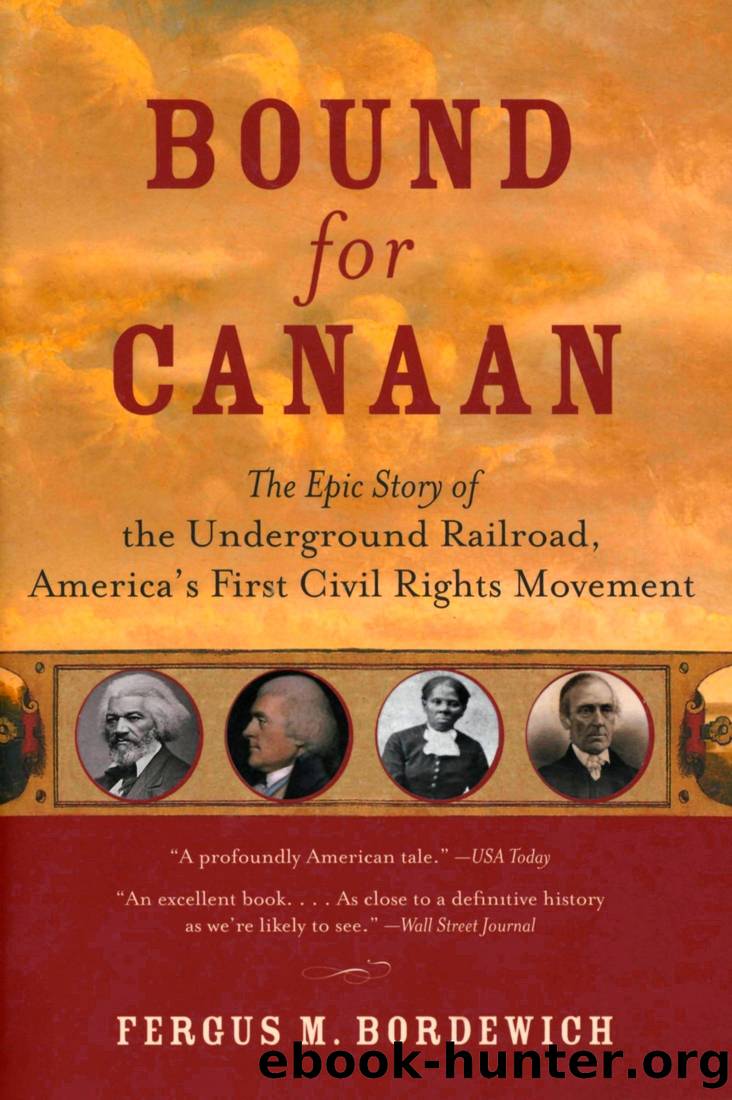Bound for Canaan: The Epic Story of the Underground Railro by Fergus Bordewich

Author:Fergus Bordewich [Bordewich, Fergus]
Language: eng
Format: epub
Tags: Social History, Social Science, Ethnic Studies, African American Studies, History, Politics, Slavery, African American, Race
ISBN: 9780061739613
Google: c8G3RVbdyGAC
Amazon: B000WCWV08
Goodreads: 22200260
Publisher: Harper Collins
Published: 2009-03-17T00:00:00+00:00
3
Humiliated in Boston and again at Christiana, the federal government was now determined to break the back of Yankee opposition to the Fugitive Slave Law, this time in the abolitionist heartland. As vigilante gangs continued to storm across Lancaster County, another confrontation was about to begin in the antislavery citadel of Syracuse, New York, where on October 1 radical abolitionists were gathering for the Liberty Partyâs national convention. No one had forgotten that back in February, Daniel Webster had pointedly warned that the federal government was prepared to enforce the Fugitive Slave Law even âhere in Syracuse, in the midst of the next Anti-Slavery Convention.â
Nevertheless, William Henry, who was known to everyone for some reason as âJerry,â had reason to feel secure as he went about his work at Morrellâs barrel-making shop. An athletic, squarely built mulatto with a striking head of red hair, the forty-year-old Henry was a skilled cooper who had come to Syracuse a year or two earlier, after escaping from slavery in Missouri. If a fugitive could expect to feel safe anywhere in the United States, it was in Syracuse, a bustling and progressive city of twenty-two thousand located in the heart of the Burned Over District. The local black population was small but militant. White antislavery forces were well-organized, and the most powerful abolitionist in the country, Gerrit Smith, lived just a few miles away in Peterboro. For years the city had been a key switching point for the Underground Railroad, receiving hundreds of northbound passengers via Elmira and Albany, and routing them, depending on the season, either directly to ports on Lake Ontario, or westward to Buffalo. The previous autumn, a public meeting chaired by the mayor himself had actually proclaimed Syracuse an âopen cityâ for fugitive slaves. Henry had no way of knowing, as September turned into October, that a Missourian named James Lear had arrived in town, and that the United States commissioner had already sent a posse of federal marshals to arrest him.
Henry was at work on a barrel when the deputies burst in on him. Taking him from behind, they threw him onto the floor, and had shackles around his feet and hands before he realized what was happening. They then sped him in a hired carriage to the office of U.S. Commissioner Joseph F. Sabine. As it did for countless Northerners, the Fugitive Slave Law put Sabine in a complex and morally uncomfortable position. He regarded himself as an abolitionist in principle, but he also believed firmly in obedience to the law. Unlike most other abolitionists, however, the fate of fugitives actually hinged on what he did. His solution may, in its own private way, have been the single most subversive event of the day. He issued the writ for Henryâs arrest without demur, but then informed his wife, who immediately reported the news to Charles Wheaton, a member of the cityâs antislavery Vigilance Committee. Wheaton, in turn, raced to the Congregational church, where the Liberty Party convention was under way.
Download
This site does not store any files on its server. We only index and link to content provided by other sites. Please contact the content providers to delete copyright contents if any and email us, we'll remove relevant links or contents immediately.
| United States | Abolition |
| Campaigns & Battlefields | Confederacy |
| Naval Operations | Regimental Histories |
| Women |
In Cold Blood by Truman Capote(3366)
The Innovators: How a Group of Hackers, Geniuses, and Geeks Created the Digital Revolution by Walter Isaacson(3111)
Steve Jobs by Walter Isaacson(2879)
All the President's Men by Carl Bernstein & Bob Woodward(2357)
Lonely Planet New York City by Lonely Planet(2204)
And the Band Played On by Randy Shilts(2180)
The Room Where It Happened by John Bolton;(2141)
The Poisoner's Handbook by Deborah Blum(2123)
The Innovators by Walter Isaacson(2088)
The Murder of Marilyn Monroe by Jay Margolis(2085)
Lincoln by David Herbert Donald(1977)
A Colony in a Nation by Chris Hayes(1913)
Being George Washington by Beck Glenn(1872)
Under the Banner of Heaven: A Story of Violent Faith by Jon Krakauer(1785)
Amelia Earhart by Doris L. Rich(1680)
The Unsettlers by Mark Sundeen(1675)
Dirt by Bill Buford(1661)
Birdmen by Lawrence Goldstone(1652)
Zeitoun by Dave Eggers(1631)
